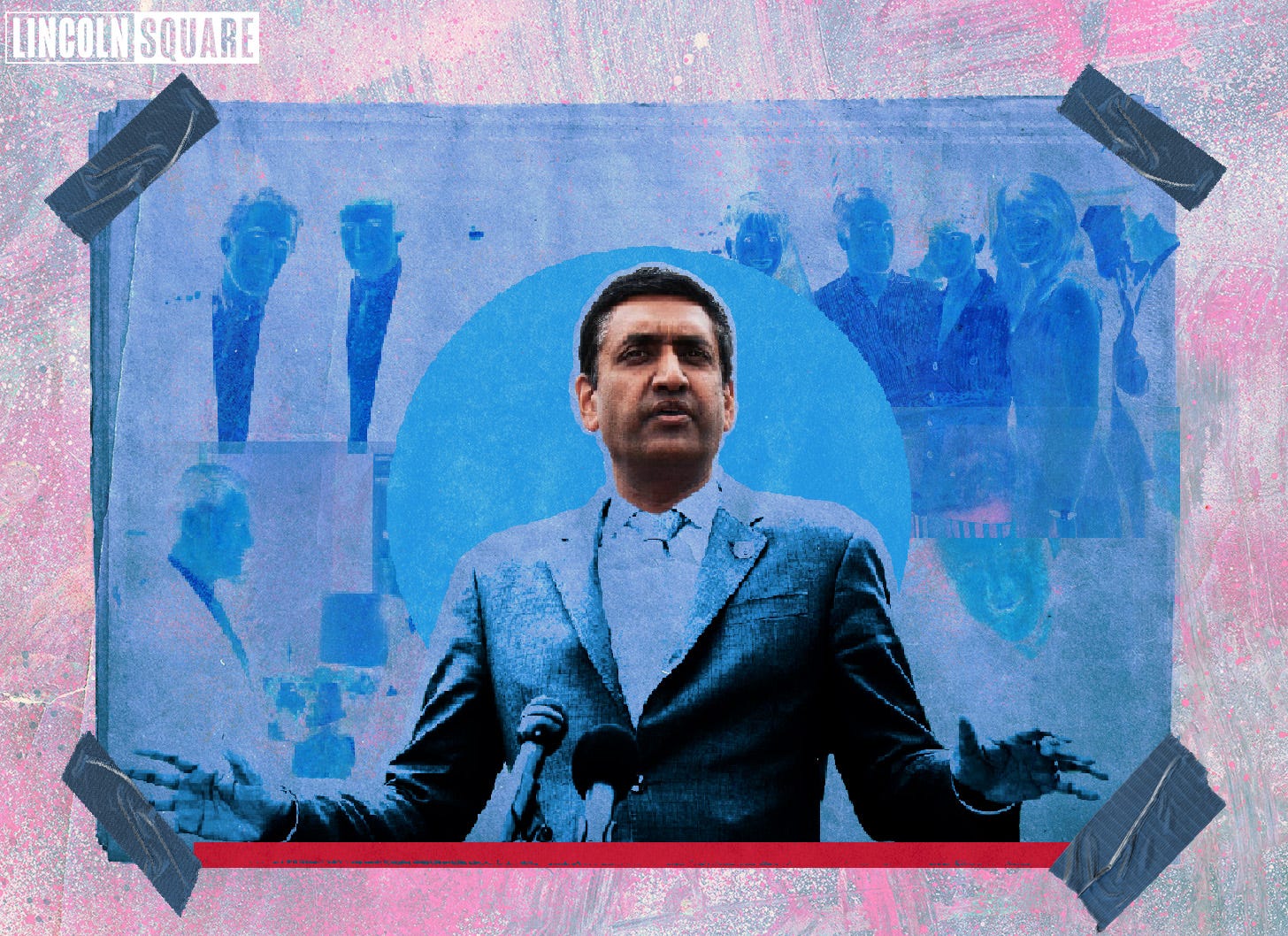In a Functional Democracy, the Epstein Files Would Already Be Public
It’s fashionable to pretend the question itself is complicated. It isn’t. We are not balancing delicate diplomatic secrets against imminent threats.
On paper, this should be simple: The government has files tied to a notorious sex trafficker, the public has a right to see them, and survivors deserve more than platitudes. The fact that we have to assemble a coalition just to pry open documents already sitting in government hands says more about the state of our politics than it does about any legal hurdle. You could see that plainly when survivors stood with two members of Congress to demand daylight. There was nothing theoretical about their ask. It was not a branding exercise. It was a statement that concealment is how the powerful turn justice into a scavenger hunt.
Congressman Ro Khanna’s presence in that moment didn’t surprise anyone who has been paying attention. He treats transparency like a duty, not a prop, and he doesn’t need to take a poll before saying the public should know what the public already owns.
What’s more unusual is his current partner in the push. Thomas Massie is a libertarian who lives off-grid and sends out Christmas cards featuring his family grinning with an arsenal of guns. And yet, even in that contradiction, Massie has at least been willing to tell his own party “no” when it comes to transparency. Jasmine Crockett — who owes him nothing, and has happily scorched Trump’s enablers in hearing after hearing — even gave him credit on the Joy Reid Show. That’s what makes this moment so strange: “Release the files” should be a clerical matter, not some act of bipartisan rebellion.
Nancy Mace is the clearest single-person example of that tension, and she’s someone I’ve criticized before for staying too quiet when accountability actually mattered. When she first came to Congress, she looked like a fairly standard suburban Republican — a status-quo sorority-girl type, the kind I went to high school with. After January 6 she briefly flashed a little independence, suggesting she might stand up to Trump, but when she saw her party was moving in the opposite direction she rebranded herself overnight into a full MAGA loyalist.
Along the way, she’s leaned into cruelty as a political brand, mocking trans people and then doubling down on offensive language toward a transgender student and even harassing a gay man in a grocery store. That history makes her recent behavior on the Epstein files complicated. To her credit, she finally did the right thing by showing up for a closed-door session with survivors, listening to them, and walking out in tears. I’ll give her a few mild brownie points for that, because even a flicker of empathy matters in this moment, and she is still one of the Republicans willing to call for the release of the files. But less than a day later she was back defending Trump with the tired, debunked story about kicking Epstein out of Mar-a-Lago, a reminder of just how quickly she retreats into the MAGA fealty spiral. Hopefully she won’t change her tune this time, but if her post–January 6 rebrand is any clue, that moment of humanity has to be viewed with the most cautious of optimism.
That loop reached into the weirder corners of the House, as well. Jasmine Crockett and Marjorie Taylor Greene have a storied history of animosity, and none of it is subtle. One operates like a cross-examination with a mic, the other like a roaming spectacle with a pass to every green room in America. Crockett’s evisceration of Greene during a House hearing went viral because she refused to let the insults slide, dismantling Greene’s act in real time. And Greene, let’s not forget, built her brand in part by mocking Parkland survivors, chasing a teenage David Hogg down the street like it was an audition tape for right-wing YouTube. Yet the pull of this issue has been strong enough that, briefly, Crockett and Greene found themselves on the same side of the fight over whether to release the Epstein files. The second Greene put her hand on the levers that might actually force transparency, the predictable pressure campaign snapped into place; there was pushback from the White House. That tells you everything about the incentive structure: Loyalty before sunlight, even when the subject is the abuse of children.
Hovering over the whole mess is Speaker Mike Johnson, who behaves like a gatekeeper for one man’s story. If your case is that Trump is clean, then releasing the documents should be the fastest route to vindication. If your case is that institutions should not be weaponized, then the worst thing you can do is weaponize secrecy. Instead of choosing either principle, leadership chose delay. That posture doesn’t protect the law; it protects a personality cult. And when “protect the leader” outranks “protect the truth,” you end up with a caucus that treats transparency as a trap and survivors as a programming risk.
All of this raises a question people keep trying to dodge by changing the subject: Does supporting the release of the files make these Republicans good people? No. Massie’s gun politics remain twisted, and that holiday tableau won’t age into decency. Mace is still playing both sides, proving in real time how quickly empathy gets repackaged as spin — the same way Laura Loomer couldn’t simply criticize Trump for accepting that Qatar plane without immediately couching it in the absurd pledge that she would “take a bullet for him.” Greene is still Greene; if she lands on the right side of an issue for five minutes, it’s usually an accident of orbit. The point isn’t to knight anyone. The point is that the bar has fallen so far that we are forced to acknowledge the bare minimum because so few will do even that. In a healthy system, “release the files” is a clerical sentence. In this one, it’s a character test.
Epstein Survivor Jess Michaels Tells her Story to Susan J. Demas
"The more I heal, the more I grieve what I lost."
The hypocrisy is not subtle on the broader right. When they were convinced the files would only embarrass Democrats, “transparency” was a rallying cry. The instant the boomerang threatened to come back across the aisle, everything turned into “process,” “timing,” “ongoing investigations,” and “careful redactions” delivered with the urgency of someone filing a lunch order. None of those words answer the moral question. They are synonyms for stall. It shouldn’t take a discharge petition, a bipartisan press conference, and a public scolding to do what should have been done years ago. Open the files. Protect victims’ identities. Stop treating the truth like a donor-only cocktail.
Crockett’s role matters in another way: It demolishes the excuse that this is just team sport. She could have scored partisan points and left it there. Instead, she credited a Republican she fights with on almost everything because he sometimes tells his own party “no.” That’s what standards look like. And if she can hold that line on national television while torching Trump’s swagger, there is no reason Republicans who’ve spent five years hashtagging “Epstein” can’t find the nerve to support the same standard — especially when one of their own is already standing there.
Mace’s case keeps gnawing because it shows how the spiral consumes people who should know better. That private moment was real. The public hedge was real, too. The first is what the job should draw out of people; the second is what the job has been redesigned to require. If Trump is clean in these files, then the truth will show it. If he isn’t, the truth will show that too. Gluing a preemptive absolution onto every statement is not prudence; it is submission. The ritual in which criticism is stapled to slavish praise hasn’t changed. The words shift. The choreography doesn’t.
It’s fashionable to pretend the question itself is complicated. It isn’t. We are not balancing delicate diplomatic secrets against imminent threats. We are weighing public access to records about a criminal enterprise that thrived because powerful people assumed rules were for other people. The only “complexity” here is political risk management dressed up as gravitas. Jokes write themselves at that point. At the rate we’re going, Congress will commission a solemn blue-ribbon panel to determine whether water is wet, then release a 200-page report after the midterms explaining that, yes, it is.
There’s another reason this fight produces such strange bedfellows. Files don’t just name names; they expose habits and hierarchies. They show who traded introductions, who pretended not to know what they knew, who monetized proximity, and who decided that being close to power was better than being on the right side of the truth. Sunlight doesn’t only land on the boldface names; it splashes onto the ecosystem that fattened them. That’s why secrecy is always the preferred instrument of people who call themselves realists. Secrecy protects the club. Disclosure forces the club to admit it’s just a room full of people who aren’t nearly as special as they tell each other.
So let me restate the baseline with no hedge. I don’t care whose name appears in those files. If there are Democrats, good — consequences. If there are Republicans, good — consequences. If it’s Bill Clinton, Donald Trump, Bill Gates, Alan Dershowitz — run the same play: evidence, accountability, justice. The law is not a team jersey. If the truth embarrasses your favorite, that’s called adulthood. If it vindicates someone you hate, that’s called integrity. The only non-option is treating the public like a child who can’t handle information the government already has.
What’s striking, if you zoom out, is how starved the system is for basic competence. Khanna shows up and insists on daylight; Massie links arms when it matters; Crockett refuses to turn standards into tribalism; Greene stumbles onto the right side and immediately gets yanked by the shoulder; Mace lets her humanity through a crack and then slaps on the qualifier; leadership treats the whole question like a test of loyalty and tries to bury the vote. None of that should be remarkable enough to fill a column. In a functioning democracy, we’d already be arguing over what the documents show, not whether we’re allowed to see them.
Here’s the clean finish. The bar is on the floor. Releasing the Epstein files isn’t a heroic act; it’s the minimum a self-respecting republic owes its people. Giving partial credit to a few Republicans for supporting sunlight doesn’t sanctify them; it indicts the culture that made such a small step notable. This is not the time for backdoor defenses, qualifying statements about Trump, or strategic amnesia about promises made when the target was your opponent. Publish the files. Shield victims’ identities. Let the names fall where they fall. If that sentence feels radical in 2025, it’s because too many powerful people spent too much time training themselves to bow.
We’re Missing the Point on the Epstein Scandal
Last month, the Deputy U.S. Attorney General met with Ghislaine Maxwell and her attorney in Tallahassee, Florida. The private meeting was unprecedented. Todd Blanche, the former personal attorney for the President of the United States, who was given a top ranking role at the Department of Justice, met with the convicted child predator on behalf of the a…







Great article Kristoffer! It’s too bad that the only protection is for the perpetrators and not the victims.
I have to use, yahoo. As I have, had to trade in my car. Goodnight!